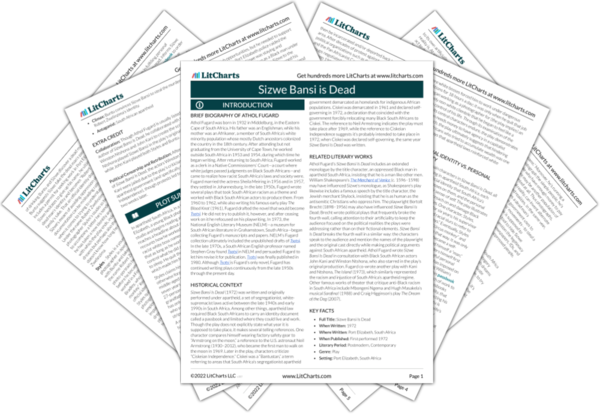In Sizwe Bansi Is Dead, passbooks represent the racist refusal of South Africa’s apartheid government to recognize Black South Africans’ human dignity and individuality. This refusal deeply harms the play’s Black characters, but they also find ways to exploit it. In apartheid South Africa, passbooks (also called Reference Books) were an identity document that the law required Black South Africans to carry. The government used passbooks to monitor and restrict Black South Africans’ travel, places of residence, and employment. The play first mentions passbooks in the stage directions, when the Black photographer Styles advertises on his studio’s name-board that he can take photographs for people’s Reference Books. Styles later claims the real purpose of his business is not to churn out passbook photos but to memorialize his clientele’s dreams, affirming their humanity—yet Styles still clearly advertises passbook photos. Styles’s advertising for passbook photos suggests that economic concerns have coerced him into complicity with South Africa’s white-supremacist government, tainting his personal aspirations as a photographer. On the other hand, Styles, a young Black man, has found a way to earn money from the racist passbooks, showing how Black characters do not merely suffer oppression but actively seek to survive and thrive under oppressive conditions.
The character Sizwe Bansi’s troubles reinforce and deepen the symbolism surrounding passbooks. Sizwe moves to a city, Port Elizabeth, to look for jobs because he wants to support his family. Yet when the authorities discover from Sizwe’s passbook that he does not have permission to be in Port Elizabeth, they order him to return home—showing their indifference to his dignity as a human being and as a father seeking to support his children. After Sizwe and his acquaintance Buntu find a passbook containing a Port Elizabeth work permit on a dead man’s body, Buntu convinces Sizwe to take the dead man’s passbook—an identity theft that will allow Sizwe to stay in Port Elizabeth and get a job. The identity theft relies on the white-supremacist government’s blindness to Black individuality: Buntu and Sizwe are assuming that white authorities rely almost solely on passbooks to identify Black people and won’t notice the difference between Sizwe and the dead man unless the police have reason to fingerprint Sizwe. Sizwe’s original passbook cruelly thwarts his aspirations, showing apartheid’s refusal to treat Black South Africans as full citizens or human beings with dreams—yet Sizwe eventually uses a new passbook to trick the government, again showing how Black South Africans did not suffer oppression passively but avoided or resisted it.
Passbooks/Reference Books Quotes in Sizwe Bansi Is Dead
MAN: I don’t want to leave Port Elizabeth.
BUNTU: Maybe. But if that book says go, you go.
MAN: Can’t I maybe burn this book and get a new one?
BUNTU: Burn that book? Stop kidding yourself, Sizwe! Anyway, suppose you do. You must immediately go apply for a new one. Right? And until that new one comes, be careful the police don’t stop you and ask for your book. Into the Courtroom, brother. Charge: Failing to produce Reference Book on demand. Five rand or five days.

Unlock explanations and citation info for this and every other Sizwe Bansi Is Dead quote.
Plus so much more...
Get LitCharts A+BUNTU: That’s it, brother. The only time we’ll find peace is when they dig a hole for us and press our face into the earth.
[Our man is amiably drunk. He addresses the audience.]
MAN: Do you know who I am, friend? Take my hand, friend. Take my hand. I am Mister Bansi, friend. Do you know where I come from? I come from Sky’s place, friend. A most wonderful place. I met everybody there, good people. I’ve been drinking, my friends—brandy, wine, beer . . . Don’t you want to go in there, good people? Let’s all go to Sky’s place.
MAN: It will tell you in good English where he stays. My passbook talks good English too . . . big words that Sizwe can’t read and doesn’t understand. Sizwe wants to stay here in New Brighton and find a job; passbook says, ‘No! Report back.’
Sizwe wants to feed his wife and children; passbook says, ‘No.’
MAN: [handing it over]. Take it, Buntu. Take this book and read it carefully, friend, and tell me what it says about me. Buntu, does that book tell you I’m a man?
[Buntu studies the two books. Sizwe turns back to the audience.]
That bloody book . . . ! People, do you know? No! Wherever you go . . . it’s that bloody book. You go to school, it goes too. Go to work, it goes too. Go to church and pray and sing lovely hymns, it sits there with you. Go to hospital to die, it lies there too!
BUNTU: It’s your only chance!
MAN: No, Buntu! What’s it mean? That me, Sizwe Bansi . . .
BUNTU: Is dead.
MAN: I’m not dead, friend.
BUNTU: We burn this book . . . [Sizwe’s original] . . . and Sizwe Bansi disappears off the face of the earth.
BUNTU: When the white man sees you walk down the street and calls out, ‘Hey, John! Come here’ . . . to you, Sizwe Bansi . . . isn’t that a ghost? Or when his little child calls you ‘Boy’ . . . you a man, circumcised, with a wife and four children . . . isn’t that a ghost? Stop fooling yourself. All I’m saying is be a real ghost, if that is what they want, what they’ve turned us into.
BUNTU [angry]. All right! Robert, John, Athol, Winston . . . Shit on names, man! To hell with them if in exchange you can get a piece of bread for your stomach and a blanket in winter.
MAN: A black man stay out of trouble? Impossible, Buntu. Our skin is trouble.












